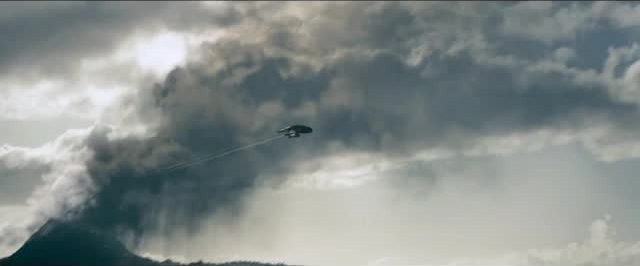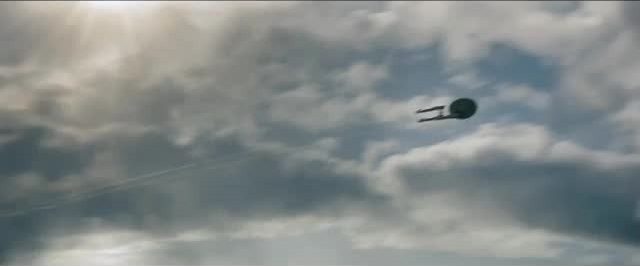“He’ll be a god to them.” So says Jor-El, the father of Superman, as he sends his son to Earth in the latest trailer for Man of Steel.
In the immediate context, Jor-El seems to be referring primarily to the fact that his son will have powers that the other residents of Earth will not. But his voice-over, later in the trailer, goes on to speak in even more elevated terms of Superman as someone who will give humanity “an ideal to strive towards,” thereby allowing humans to “join [him] in the sun.” Lois Lane adds to the mythology, as it were, by noting that some people think of Superman as a “guardian angel”.
Powerful aliens don’t always come with messianic overtones, of course. Indeed, this very same trailer gives us a glimpse of General Zod, who comes from the same planet as Superman but whose own intentions for us are nowhere near as benign. And as we saw in the original Superman films starring Christopher Reeve, even Superman himself can be a somewhat complicated messiah, with flaws that are strikingly similar to the deep flaws of Martin Scorsese’s Jesus in The Last Temptation of Christ.
So, it will be interesting to see how these messianic themes are fleshed out, or not, in the movie itself. In the meantime, I note that there are at least two other current movies — one of which is in theatres right now, and the other of which will be soon — that apparently play on the idea that aliens can either present themselves as gods or be worshipped as such by the inhabitants of the planets they visit.
In both cases, as far as I know, the alien-god idea is presented very briefly, and doesn’t necessarily have all that much to do with the major themes of either movie. But both of these passing references could, arguably, count as spoilers for the movies in question, so you may or may not want to stop reading now.
First, Star Trek into Darkness.
I don’t know if it’s all that big a spoiler to talk about something that happens in the first 15 minutes, much of which was already shown to the public prior to the IMAX screenings of The Hobbit a few months ago, but TrekMovie.com reports that an extended version of that preview was shown at CinemaCon last week, and it concludes with the natives of an alien planet — the same natives who were chasing and throwing spears at Kirk and McCoy only minutes earlier — “looking up at the Enterprise and beginning to pray to it (Holy Prime Directive Violation!).”
The newest TV spot for the film includes the images below, which presumably give us a natives’-eye-view of the Enterprise as it prepares to leave their planet:
The gods-from-outer-space bit here might be nothing more than a throwaway gag, a nod perhaps to the cargo cults of our own world or to the various theories about ancient religions being inspired by contact with aliens a la Chariots of the Gods.
Certainly past Star Trek episodes have toyed with the idea that ancient religions here on Earth might have been inspired by visitors from outer space. In the original series (and its animated follow-up), the Greek god Apollo and the Christian demon Lucifer are both aliens who visited our planet in the past. In ‘Return to Tomorrow’, three beings with god-like powers speculate that their species might have inspired the story of Adam and Eve — but this is quickly rebutted by a member of Kirk’s crew, who says we already have other, more scientific explanations for the origin of human life. And then, more recently, Star Trek: Voyager revealed that Chakotay’s ancestors once interacted with a race of ‘Sky Spirits’ who were, themselves, extra-terrestrials.
Mike Hertenstein has also noted, in his book The Double Vision of Star Trek, that when the Vulcans make “first contact” with humans in Star Trek: First Contact (1996) — thereby ushering in a period of great human progress — the Vulcans arrive in a manner that resembles the alien messiahs of past films.
If memory serves, Hertenstein objected to the fact that that film called on Vulcans to play the “alien messiah” role, because the Vulcans were already so familiar to Star Trek viewers that they could not assume the same sort of lofty mystical status that other alien messiahs have assumed over the years. But Star Trek: First Contact actually anticipates and even encourages that reaction, by demystifying and even humanizing the Vulcans right from the get-go: first Zefram Cochrane shakes the Vulcans’ hands when he cannot imitate their V-shaped salute, and then he plays Roy Orbison songs on his jukebox, much to the Vulcans’ bemusement.
So the new Star Trek film is, arguably, just taking things a step further, by making the mostly human characters the “gods”, and treating the idea as one big joke.
As for the third film I’m thinking of?
Well, it’s in theatres right now, and the “god” aspect doesn’t really become explicit until the very end, so I don’t want to say too much about it here.
But suffice it to say that this film plays on certain Gnostic ideas about the “demiurge”, an artificial entity (from outer space, in this case) that has enslaved humanity by making it forget its true nature — and that, at some point in the story, the protagonists realize that they will have to turn against this so-called “creator”.
So, three films, and three very different riffs on the idea that those who visit other planets may be regarded as “gods” by the planet’s inhabitants.














